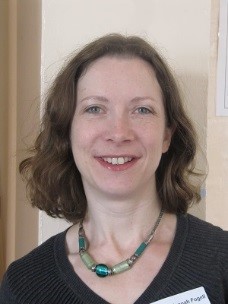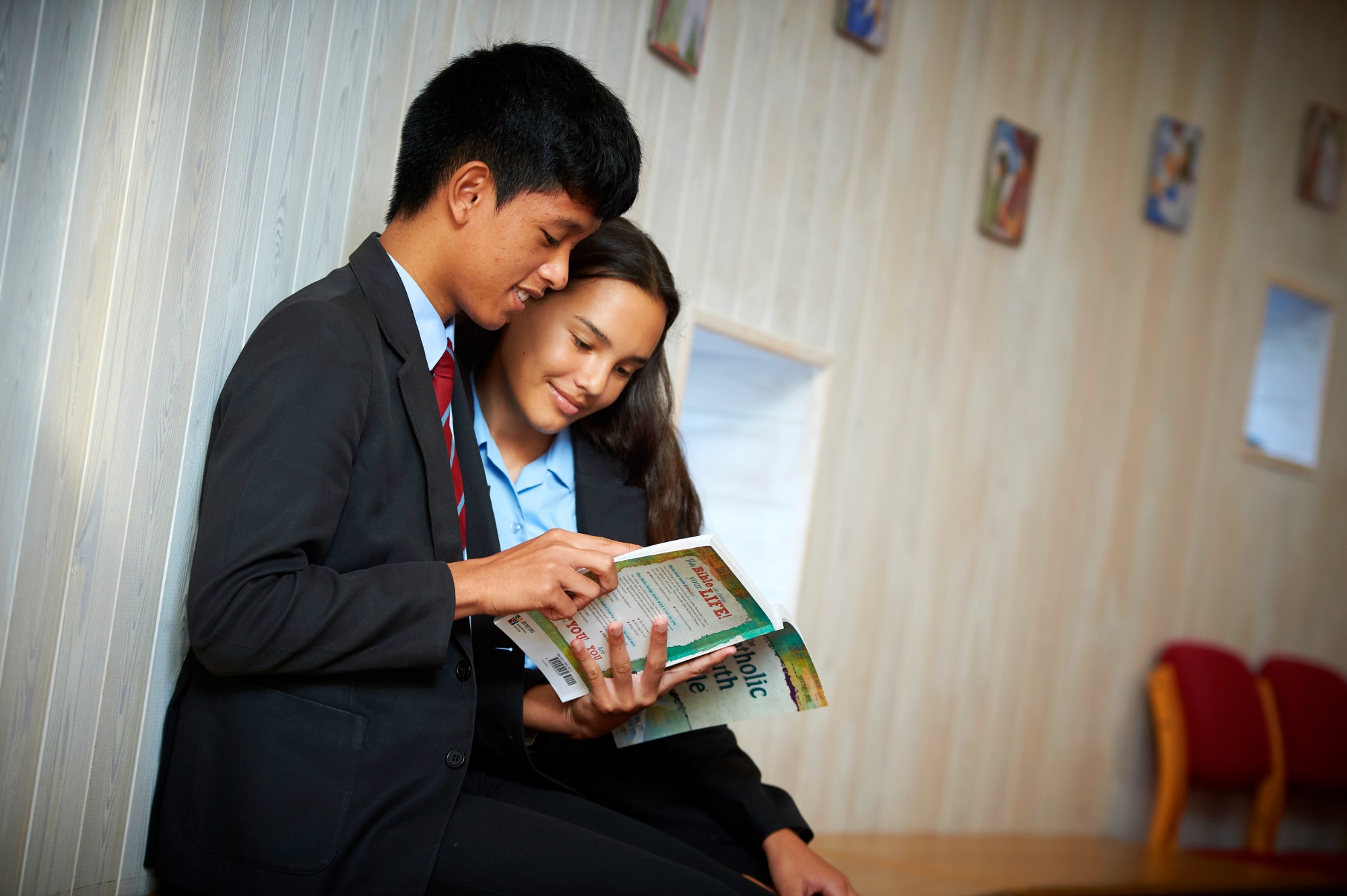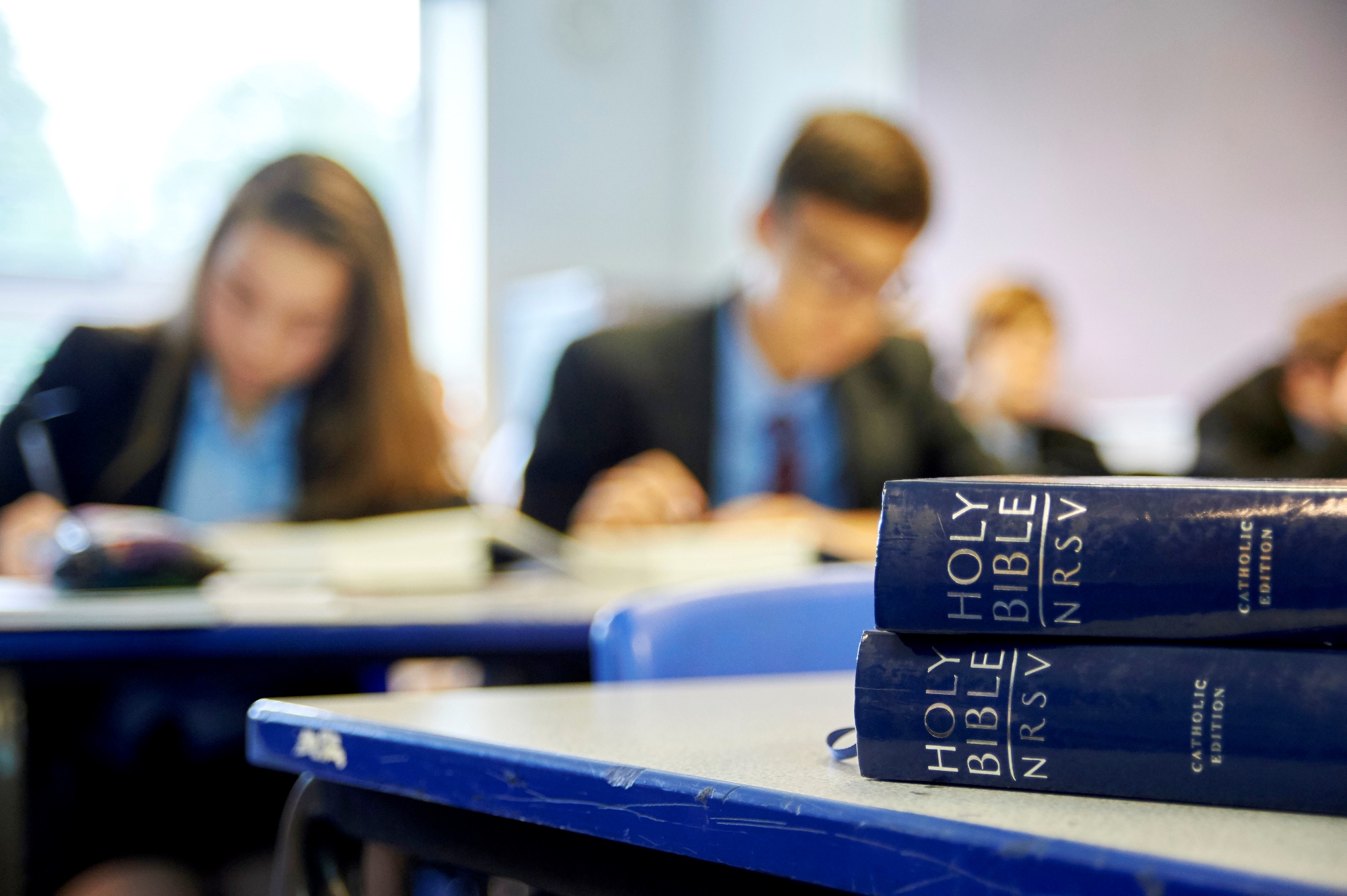Religious Education

Ms H Fogell
Head of Religious Education
The Team
| Mrs I Campbell | Teacher of Ethics |
| Ms H Fogell | Teacher of Philosophy |
| Mrs M Morling | Teacher of Religious Education |
| Miss F Pollard | Teacher of Ethics |
| Mr M Steady | Teacher of Philosophy |
Introduction to the Department
Welcome to the Religious Education Department. At the core of Catholic education lies the Christian vision of the human person. This vision is expressed and explored in classroom religious education. Therefore, classroom religious education is at the heart of our school’s mission to be ‘Christ to all’. Our purpose is to provide students with a rigorous academic experience in which to engage with the deepest questions of life and find reasons for hope.
Our programme of study is based upon the ‘Religious Education Curriculum Directory for Catholic Schools’ (2012) produced by the Bishops’ Conference of England and Wales and it takes up 10% of the timetable. It provides the opportunity for students to learn about religion and from religion to explore a personal response to what they have learnt. We aim to develop skills of knowledge, understanding, analysis and evaluation and confidence in using religious language so that students are able to discuss their learning and reflections in an articulate manner.
Key Stage 3 Information
The Key Stage 3 programme of study follows a main theme in each year. Developing an understanding and appreciation of world religions is incorporated into the Key Stage 3 curriculum and a number of the major world religions are studied.
Year 7 follow the theme ‘Our Beliefs and Practices’. We look at various aspects of the Catholic faith, with the aim of consolidating and building upon the students’ prior knowledge and understanding. The units are: A Rough Guide to Christianity; Arguments for the existence of God; The Liturgical Year; Sacraments; Place of Worship and Introduction to World Religions and Hinduism.
Year 8 follow the theme ‘Our History’. We look at the origins of the Church up to the present day. This includes a study of the history and teachings of the Old and New Testaments, an examination of the Jewish religion and of the spread of Christianity to the present day. The units are: Creation and Covenant; Judaism; Lent and Easter; In God’s Image, Human Rights and Social Justice and Spread of Christianity.
Year 9 follow the theme ‘Our Inspiration and Faith Today’. We explore the life of Christ as the inspiration of Christians today and examine a number of his key teachings. This incorporates a study of the beliefs and values that shape the life and faith of Catholics today. The Year 9 units are: Islam, Jesus, the Word of God; Discipleship; Kingdom of God; Love and Relationships (SRE unit); Origins and Meanings (the first unit of the Religious Studies Eduqas GCSE Catholic Christianity course).
Religious Education also contributes to the school’s provision of Sex and Relationships Education. The Key Stage 3 curriculum includes age appropriate content for each year covering, for example, issues related to friendships, different types of family life, love and marriage. The lessons promote examine and debate relevant Catholic Church teaching. The aim is for students to understand what the Church teaches and the reasoning behind the teachings.

Key Stage 4 Information
Students in Year 10 will continue their study of the Eduqas Religious Studies route B course, which they began in the summer term of Year 9. This course comprises of three components. The first two components, Foundational Catholic Theology and Applied Catholic Theology, are together worth 75% of the overall grade. The third component, Judaism, is worth 25% of the overall grade. The units covered in this course are Origins and Meaning; Good and Evil; Life and Death; Sin and Forgiveness; Judaism: Beliefs and Teachings; Judaism: Practices.
Students in Year 11 will complete their study of the Eduqas Religious Studies route B course, covering the topics of Life and Death and Sin and Forgiveness.
Students sit three exams for the Eduqas course at the end of Year 11. Component one, Foundational Catholic Theology and two, Applied Catholic Theology, are each 1 hour and 30 minutes long, and each worth 37.5% of the grade. Component 3 is the world religion part of the course. This covers Jewish beliefs and practices. This component has a weighting of 25%. The GCSE exams will measure student achievement in relation to their ability to demonstrate knowledge and understanding of religion and belief, as well as their ability to analyse and evaluate aspects of religion and belief. Students will also need to demonstrate an understanding of similarities and differences within and between religions.

